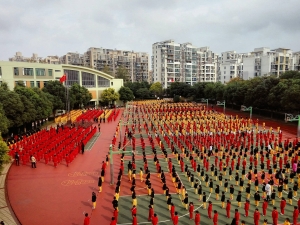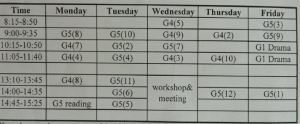By Sophie Musson, Teacher in downtown Shanghai
I am now 3 months into my 10-month teaching placement in Shanghai. The purpose of this article is to inform incoming teachers or anyone considering teaching in Shanghai what to expect when placed in an area downtown. When I first decided to become an ESL teacher in China I was faced with all the normal comments and criticisms from friends and family…one which I think we’ve all heard is ‘Is that even a real job?’. Well yes, for those of us working in downtown Shanghai it very much is, and this article will certainly prove it.

First of all, I think it’s important for me to put into perspective the importance of learning English in Shanghai. You might have seen in recent news that Shanghai obtained a greater score in the English Proficiency Index (EPI), an index that measures the English-speaking proficiency of adults, than Hong Kong. English is becoming ever-increasingly important in Shanghai due to a more prominent influence from international businesses and therefore a greater number of employment opportunities that require a good level of spoken English. Long before students are at the age of applying to jobs however, they are required to take an English test to gain a place at University. This test forms part of the GaoKao, China’s most important exam and one of the greatest turning points in a student’s life. A bad score on the GaoKao could prevent you from getting into a good University with good job prospects, so it is not surprising that preparation for this moment starts from a very young age. And by ‘young age’ I mean in primary school. The children I teach have 8 English lessons per week (including mine). In addition to this, those who can afford it will have private English tutoring. Parents want their children to succeed in English. With this knowledge, an ESL teacher in Shanghai shouldn’t take their responsibility lightly. With the city of Shanghai right on your doorstep, it can be tempting to let your work take a backseat to your social life. We have all heard of an ESL teacher who has too much to drink every weekend so goes into every lesson and sticks a movie on. But that is NOT what you are here for. More demanding hours for teachers placed in downtown areas does not mean that your students should suffer at the expense of your social life. We still have time to do the things we would like, but perhaps not as much as we originally expected.
How much work will I do?
So, what should you expect if placed in downtown Shanghai? I work at a very big primary school in the northern part of Pudong New District. Pudong New District is located East of the Huangpu River (in Chinese Pu means river and Dong means East) and is still undergoing vast levels of development. My school is huge – there are 50 students in each class, 12 classes in each grade, and grades 1 to 5…that’s 3000 students in total. I have no teaching assistant in my classes, which means I manage 50 students by myself in every lesson. Below I have included a picture of my schedule to show you what a work week looks like for me.

I teach 12 Grade 5 classes, 8 Grade 4 classes, a Grade 1 Drama class, and a Grade 5 reading class. Once a month I also attend a meeting or an open class workshop on a Wednesday afternoon. This means in my average week I have 23 lessons and 4 lesson plans to do. I think I can speak on behalf of most downtown teachers when I say we looked at our schedules and thought ‘Why do lots of those boxes have writing in…?’ because I think for most of us, our thought process before leaving England went somewhat like this… ‘Lessons are only 35-minutes long and at most I’ll have 26 lessons per week, that’s less than 16 hours of teaching! I’m going to have so much time to travel and explore.’ We were all very wrong.
As nice as this would be, the reality is very different. As you can see from my schedule, having 26 lessons per week out of a possible 35 means you are teaching for 74% of the total number of lessons in a week. Compare this to the 10 lessons a week your Chinese co-workers have, and you realise that you have quite a big responsibility. On top of this you also need give yourself time to lesson plan and do any other jobs you might have been given (mark homework, prepare for teacher’s meetings etc.) This type of schedule is very much different from the one you would be given if you worked in suburban Shanghai. I’ve heard of teachers that have 8 lessons a week in the suburbs. However, in these districts the city centre is a lot more than a stone’s throw away so there are pros and cons to every schedule and situation. For those of you who are considering coming to work in Shanghai, I’d like to highlight some of the benefits of working downtown with a busy schedule.
1) You have more hours but you get more out of it. Teaching is one of those jobs where you get out what you put in. Spend 5 minutes planning a lesson and that lesson is sure to be the most painful 35 minutes you will ever have to endure. Spend an hour preparing your lesson and you’ll enjoy it a lot more. Spending more hours preparing and planning means the skills you get from a teaching job (organisation, public speaking, problem solving, communication) will always be improving.
2) You build better relationships with your kids. Having more lessons in school means you spend longer at school each day. You will see your kids walking the corridors, on the playground at lunch, coming to school in the morning and leaving in the afternoon. This gives you the chance to speak to many of your students outside the classroom. I love when my students try to speak with me outside of class, being able to hold a conversation with your kids in English is one of the most rewarding aspects of the job…and leaves you with so many hilarious stories to tell.
3) You could build better relationships with your colleagues. How much your Chinese colleagues speak to you can vary from school to school. It takes work to build good relationships with your Chinese teachers, something you can only do when you are at school.
4) You get involved more with the school. When you spend more time in school you get to hear about and participate in things you otherwise wouldn’t have known about for example, I got to accompany my Grade 5s on a trip last month.
5) You get paid more than you do in suburban areas. Pay after tax for those working in downtown Shanghai is roughly £1370 per month (with the current exchange rate of 1 GBP to 8.4 CNY). This is very good wage in China and you should be able to save about 1/3 of this if you budget carefully.
6) When you leave school in the afternoon, the centre of Shanghai is right on your doorstep. Although you might spend long gruelling days in school, when you leave and return home it doesn’t take you long to get to exciting places. My housemate and I often go to Lujiazui (home to the iconic Shanghai skyline) for a walk on week nights. It takes us 10 minutes to get there by metro, and you can see the sun set across the river.
Now it’s time to address the negatives of working downtown. Maybe these are some of the things I wish I had known before I had come here, so that I came with a more realistic expectation in mind.
1) You have less time to travel. Unlike your suburban counterparts, days off downtown are rare. You will be in school for most of the day every day. Therefore, if you were hoping to spend a lot of your time travelling you should lower your expectation. Flights out of Shanghai on Friday nights are expensive which limits the amount of travelling you can do at weekends. However, there are generous holidays for us including National Week (a one week holiday in October) and our winter break (6 weeks in Jan/Feb time) which can be made the most of.
2) You will be paying for your own rent. Although your pay is more downtown you will also have higher rent. My rent amounts to £360 per month, which is good considering I live quite centrally! Shanghai is an affordable city to live in, especially with the salary you will be paid. It is important to note however, that a lot of landlords will ask for 3 months rent plus a deposit before you move in. You need to be prepared for this when you move here.
3) You won’t have as much time to do tutoring jobs. Most ESL teachers I know take on extra tutoring jobs to get extra money. These jobs pay £30 pounds an hour on average. With a busy downtown schedule, you will probably be too physically and mentally exhausted by the evening to even consider tutoring. However, if you can stomach it, taking on these jobs is beneficial to your finances.
Where will I live?
With placements in Shanghai, it is usual to not know the district you will be in until you arrive in China. To give you a better idea of where you might be end up living, I have made a list of the metro stops some current downtown Teach English In China teachers live at.
Pudong – Lancun Rd, Guanglan Rd, Yaohua Rd, Yunshan Rd
Puxi – Lujiabang Rd, Jiangsu Rd, Xinzhuang, Zhongshan Park, West Yan’an Rd.
If you look at these metro stops on the Shanghai metro map you will see they are all within a reasonable distance of the city centre, a huge bonus of working downtown. When you arrive, you will be given a coordinator who will help you to find an apartment. You can also get in contact with estate agents yourself who will show you lots of flats in the area you want to live. I live with two other Teach English In China teachers at Lancun Rd; we found a three-bedroom apartment 5 minutes walk from the metro. Our flat is owned by a company called ziroom. I recommend taking a look at their website, they have rooms all over Shanghai furnished to Western standards. In Shanghai, the average commute is about 1 hour. Some people choose to live very close to their school however, if you want to live with others you will probably find somewhere that is an equal distance for everyone. My current commute to work is 45 minutes door to door.
I think the bottom line of this article is that in China’s big cities, learning English is extremely important. It is not uncommon for rich families to try and get their children into schools in the USA or UK. For families who are not as fortunate as this, it is hoped that their children’s English GaoKao score will contribute towards their place at a top University. That’s why if you are hoping to come to Shanghai, and live in a downtown area with the city centre on your doorstep, also be prepared to give your all in your job. Yes, it is exhausting but it is also extremely rewarding. Working longer hours means you feel a part of your school and when returning to England you are prepared to start your graduate career. In addition, you get so much out of the experience. I had never considered teaching before coming to China, and never thought I would. I am now hoping to return to England to start a career in teaching.
The views in this article come from my own personal experience. The working schedules here hugely vary for example; it is not uncommon to be placed in multiple schools with all 5 grades to teach. I do believe though that what you put in is what you get out. Having a busy schedule means you get the opportunity to put this extra effort into your work which in turn allows you to see the benefits. When we go home and our parents say ‘Can you get a REAL job in England now?’ we can laugh to ourselves knowing that we did have a very REAL job in China all along.
Has this inspired you to begin your own teaching adventure in China? Explore our programs or head to our application page to get started today!


Leave A Comment
You must be logged in to post a comment.